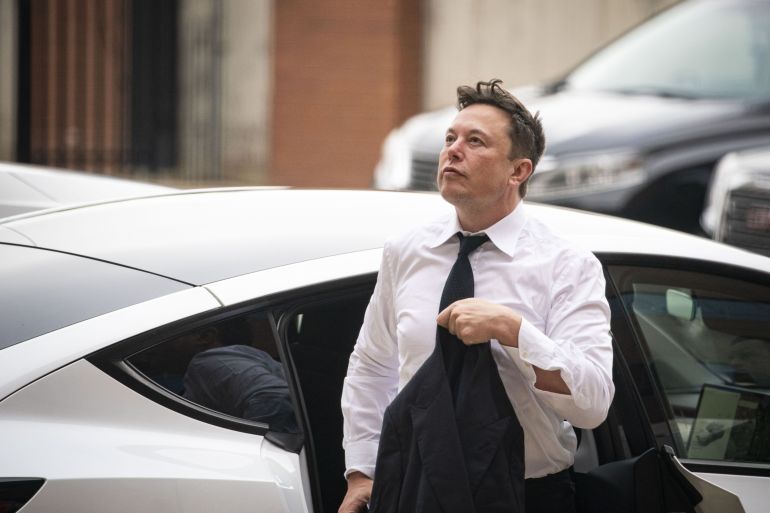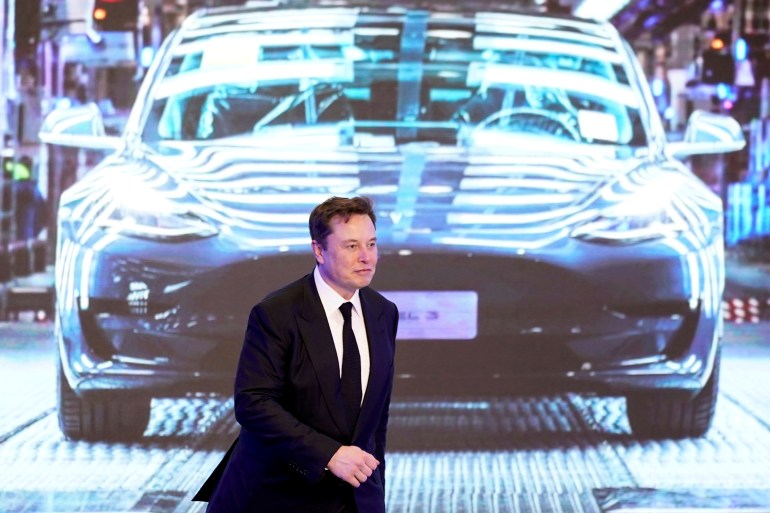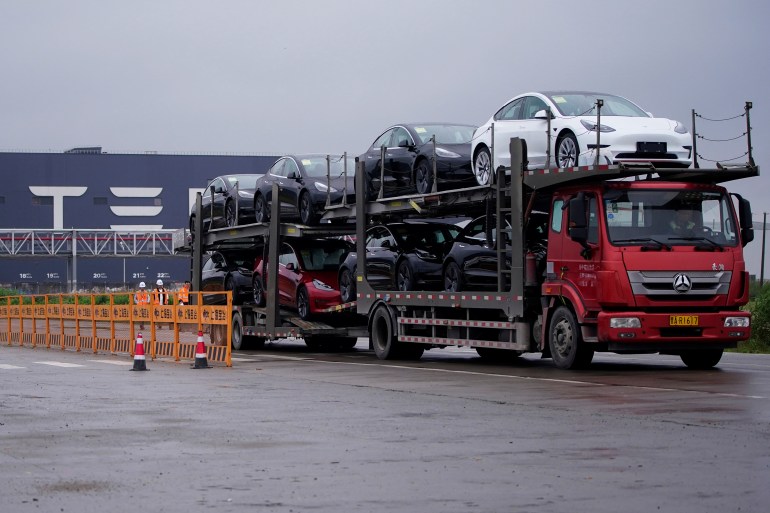Musk wants to cut 10 percent of Tesla jobs: Report
Tesla CEO Elon Musk has a ‘super bad feeling’ about the economy, he said in an email to executives seen by Reuters news.

Tesla CEO Elon Musk has a “super bad feeling” about the economy and needs to cut about 10 percent of jobs at the electric carmaker, he said in an email to executives seen by the Reuters news agency.
The message, sent on Thursday and titled “pause all hiring worldwide”, came two days after the billionaire told staff to return to the workplace or leave, and added to a growing chorus of warnings from business leaders about the risks of a recession.
Keep reading
list of 4 itemsTesla dumped by S&P ESG index as Musk calls label a ‘scam’
Musk’s tweets on Tesla funding reckless, court rules
Tesla recalls 130,000 EVs for touch screen malfunctions
Almost 100,000 people were employed at Tesla and its subsidiaries at the end of 2021, its annual Securities and Exchange Commission (SEC) filing showed.
The company was not immediately available for comment.
Tesla shares fell nearly 5 percent in US pre-market trade on Friday and its Frankfurt-listed stock was down 3.6 percent after the Reuters report. US Nasdaq futures turned negative and were trading 1 percent lower.
Musk has warned in recent weeks about the risks of recession, but his email ordering a hiring freeze and staff cuts was the most direct and high-profile message of its kind from the head of a carmaker.
So far, demand for Tesla cars and other electric vehicles (EV) has remained strong and many traditional indicators of a downturn – including increasing dealer inventories and incentives in the United States – have not materialised.
But it has run into some regulatory woes. The National Highway Traffic Safety Administration (NHTSA) said Friday it asked the EV company to respond to questions by June 20 after it received 758 reports of unexpected brake activation tied to the carmaker’s driver assistance system Autopilot.
In February, NHTSA opened a preliminary evaluation into 416,000 2021-2022 Tesla Model 3 and Model Y vehicles in the US after the agency said it had received 354 complaints about the issue during the past nine months.
Tesla has also struggled to restart production at its Shanghai factory after COVID-19 lockdowns forced costly outages.
“It is always better to introduce austerity measures in good times than in bad times. I see the statements as a forewarning and a precautionary measure,” said Hanover-based NordLB analyst Frank Schwope.

Many carmakers achieved record profits in 2021, but the economic situation is now more uncertain, he noted.
Gloomy forecast
Musk’s gloomy outlook echoes recent comments from executives including JPMorgan Chase & Co CEO Jamie Dimon and Goldman Sachs President John Waldron.
A “hurricane is right out there down the road coming our way”, Dimon said this week.
Inflation in the United States is hovering at 40-year highs and has caused a jump in the cost of living for Americans, while the Federal Reserve faces the difficult task of dampening demand enough to curb inflation while not causing a recession.
Musk, the world’s richest man according to Forbes, did not elaborate on the reasons for his “super bad feeling” about the economic outlook in the brief email seen by Reuters.
It was also not immediately clear what implication, if any, Musk’s view would have for his $44bn bid for Twitter. US antitrust regulators cleared the deal on Friday, sending Twitter shares up nearly 2 percent in pre-market trading.
Several analysts have cut price targets for Tesla recently, forecasting lost output at its Shanghai plant, a hub supplying EVs to China and for export.
China accounted for just more than a third of Tesla’s global deliveries in 2021, according to company disclosures and data released on sales there. On Thursday, Daiwa Capital Markets estimated Tesla had about 32,000 orders awaiting delivery in China, compared with 600,000 vehicles for BYD, its larger EV rival in that market.
Wedbush Securities analyst Daniel Ives said in a tweet it appeared Musk and Tesla were “trying to be ahead of a slower delivery ramp this year and preserve margins ahead of an economic slowdown.”
‘Pause all hiring’
Before Musk’s warning, Tesla had about 5,000 job postings on LinkedIn from sales in Tokyo and engineers at its new Berlin gigafactory to deep learning scientists in Palo Alto. It had scheduled an online hiring event for Shanghai on June 9 on its WeChat channel.

Musk’s demand that staff return to the office has already faced pushback in Germany. And his plan to cut jobs would face resistance in the Netherlands, where Tesla has its European headquarters, a union leader said.
“You can’t just fire Dutch workers,” said FNV union spokesperson Hans Walthie, adding Tesla would have to negotiate with a labor union on terms for any departures.
In a Tuesday email, Musk had said Tesla employees were required to be in the office for a minimum of 40 hours per week, closing the door on any remote work. “If you don’t show up, we will assume you have resigned,” he said.
Musk has referred to the risk of a recession repeatedly in recent comments.
Remotely addressing a conference in mid-May in Miami Beach, he said, “I think we are probably in a recession and that recession will get worse.”
Other companies have cut jobs or are slowing or pausing hiring amid weakening demand.
Last month, Netflix said it had laid off about 150 people, mostly in the United States, and Peloton said in February it would cut 2,800 jobs. Meta Platforms, Uber and other technology companies have slowed hiring.
In June 2018, Musk said Tesla would cut 9 percent of its workforce as the then-loss-making company struggled to ramp up output of Model 3 electric sedans, although data in its SEC filings showed reductions were more than offset by hiring by year-end.